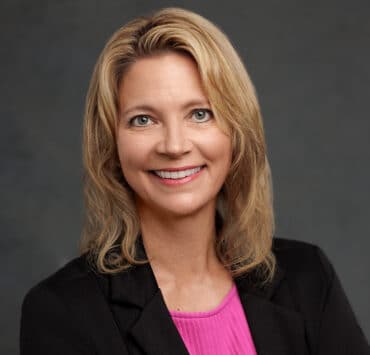Andrea Herron is determined to make work better for people. In addition to her day job as head of people for WebMD Health Services, she’s a published author of There’s an Elephant in Your Office and host of The HR Scoop podcast. Her career experience, background in psychology, and passion for people have given her a unique perspective on change management, human connection, adapting and rethinking space, and mental health in both physical and virtual workplaces.
A Kentucky native, Herron earned a bachelor’s degree in psychology and a master’s in industrial organizational psychology from Western Kentucky University. “I’ve always been curious why people do what they do,” she says.
After earning her master’s, Herron dove right into HR at Berry Plastics, a global plastic manufacturer in southern Indiana. But she was eager to plant roots somewhere better suited to her family’s lifestyle and relocated to Portland, Oregon. “I left my job, loaded a U-Haul, [took my] six-month-old baby, and off we went to a town we’d never been to,” Herron remembers.
She joined the HR team at ClearResult, an energy conservation business, and later became vice president of HR at the Oregon Humane Society. When she was recruited to join WebMD Health Services as its head of people, it was the natural step forward. “HR—similar to nursing or teaching—deals with people,” Herron says. “Sure, there are industry differences, but it’s still a group of people trying to accomplish something.”
Since she joined WebMD Health Services nearly five years ago, Herron has utilized her experience across industries to drive meaningful change. The scope of her influence currently includes top-to-bottom organizational development, leadership mentoring, and business strategy budgeting for more than three thousand employees in several business lines worldwide.
“I wear so many hats I could open a store,” Herron says. “The more I impact real people and make the workplace better for the humans that come in every day, the more I want to keep doing it.”
For Herron, accounting for human nature makes change management more proactive, especially amid what’s being called the Great Resignation. “In the past two years, people have had the time to consider where they want to spend their time, energy, and resources. That’s why we’re seeing so much turnover in every industry,” she explains.
People innately resist change, instinctively want to know how that change is going to affect them, and typically need time to adjust to new workflows. So when dealing with change, Herron doesn’t make unilateral decisions: she seeks diverse perspectives representative of the employee networks that will be experiencing the change.
“If you bring a sense of curiosity and an open mind to a situation and consider as many perspectives as possible, you’re going to save so much chaos,” Herron says.
Interpersonal connections can make change easier; conversely, Herron notes, when people lose those connections their productivity and creativity go down. “There’s no context, tone, or body language in an email; it’s all a projection of how we’re thinking, the mood we’re in, and what happened five minutes before,” she remarks about the remote working model. “Creating any opportunity for people to casually connect is worth every dollar spent in retention and engagement.”
In WebMD Health Service’s virtual office space, staff members participate in chat channels devoted to topics like sports, animals, parenting, or crafts. Wednesday coffee chats are on the calendar once a month for anyone wanting to disconnect from work and connect with each other. Every other Friday, Herron’s team hosts a casual all-staff meeting called TGIF, where the leadership team shares real-time updates, celebrates wins, and highlights volunteer opportunities.
“Equally important as rethinking your virtual space is adapting your physical space,” Herron says. “We spend so much time in a workspace. Do we really consider how we’re using it? Do you want to have spaces that make people feel excluded? Do people of color, women, and parents all feel comfortable and included in your office?”
For Herron, making the workplace more inclusive means more sunlight and greenery to psychologically put people at ease, an office set-up that accommodates open collaborative workstations as well as quiet focused spaces, and representative faces on company sites and in office pictures.
The pandemic has made the conversation around mental health more visible, and Herron is armed with a psychology background and the professional resources to address these issues head-on in every workplace. She has found that mental health shows up differently in person versus virtually, an idea that’s discussed at length in the second edition of her book, There’s an Elephant in Your Office (out in February 2022). “[The book is] a tactical guide to helping people, and the managers of those people, who may be struggling with mental health on the job,” Herron says.
Additionally, in her podcast The HR Scoop, Herron talks to other HR professionals about how to address these issues in any industry of any size. “Work is not working for a lot of people,” Herron says. “The more you can be your quirky self and admit your mistakes, the more it gives permission for other people to do the same. If we can realize we’re all doing our best, it becomes so much easier.”


